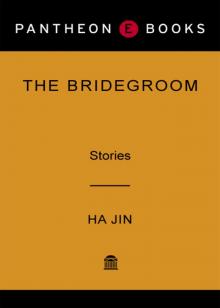Read The Bridegroom Storyline:
From the remarkable Ha Jin, winner of the National Book Award for his celebrated novel Waiting, a collection of comical and deeply moving tales of contemporary China that are as warm and human as they are surprising, disturbing, and delightful.In the title story, the head of security at a factory is shocked, first when the hansomest worker on the floor proposes marriage to his homely adopted daughter, and again when his new son-in-law is arrested for the "crime" of homosexuality. In "After Cowboy Chicken Came to Town," the workers at an American-style fast food franchise receive a hilarious crash course in marketing, deep frying, and that frustrating capitalist dictum, "the customer is always right."Ha Jin has triumphed again with his unforgettable storytelling in The Bridegroom.Amazon.com ReviewIt's the little things that kill us, as that master of the miniature Ha Jin well knows. Not oppression in general, but the tea thrown at us by railroad policemen; not failure, but the old flame who fails to visit; not grief, but the peanuts our kindergarten teacher stole from our pockets. In The Bridegroom, such moments run surprisingly deep, as if they traced the grooves history has left on individual hearts. The book's 12 tales capture a China in transition, en route from Maoism to market-friendly socialism, from isolation to increasing contact with the West. "I never thought money could make so much difference," says the narrator of "An Entrepreneur's Story," who's been transformed from black-market lowlife to new-economy hero. He wins respect and gets the girl, but it all feels too easy somehow, and he revenges himself by lighting his kerosene stove with bank notes. Other characters navigate this sea change with similar bewilderment. The professor mistaken for "The Saboteur" thinks news articles about the end of the cultural revolution mean he can reason with the police (wrong!), while the bridegroom of the title story is hauled off to jail for so-called hooliganism rooted in "Western capitalism and bourgeois lifestyle"--that is, loving other men. "What a wonderful husband he could have been if he were not sick," his father-in-law thinks. In the story that deals most explicitly with the conflict between East and West, an American chain named Cowboy Chicken sets up shop in Muji City. The new order isn't that different from the old one, thinks one of the Chinese workers: "We nicknamed Mr. Shapiro 'Party Secretary,' because just like a Party boss anywhere he didn't do any work. The only difference was that he didn't organize political studies or demand we report to him our inner thoughts." In the end, as often happens, greed begets revolution--but whose greed? When the workers at Cowboy Chicken go on strike, jealous of one of their coworker's paychecks, they're replaced by an African American woman who teaches English at a nearby college and her students, who sing "We Shall Overcome" while they wipe tables. But as in Jin's National Book Award-winning novel, Waiting, even the broadest political and cultural ironies are painted with an extraordinarily light-handed brush. Despite their apparent simplicity, these stories run deep; it's as if some 19th century master had wandered into our midst, writing prose whose unruffled surface recalls the virtues of the very long view. Like Chekhov, another great miniaturist and the writer he most resembles, Jin understands that humor is compassion, that a well-honed appreciation for the absurd is sometimes the best and most honest way to honor failed lives. While his characters attempt to balance the needs of the self and the demands of the state, we see less what is foreign to us than what is native to the human heart. --Mary ParkFrom Publishers WeeklyIt's difficult to think of another writer who has captured the conflicting attitudes and desires, and the still-changing conditions of daily life, of post-Cultural Revolution China as well as Ha Jin does in his second collection, which follows his NBA-winning novel, Waiting. These 12 stories attain their significant cumulative effect through spare prose penetrated by wit, insight and a fine sense of irony. One realizes in reading them that while human nature is universal, China's cultural and political repression exacerbates such traits as fear of authority (and the desire to circumvent it), male chauvinism and suspicion of outsiders. In "The Woman from New York," a young wife and mother who goes to the States for four years finds, on her return to Muji City (where most of these tales are set), that her child, her marriage, her job and her honor are forever lost. American business methods clash with Chinese traditions in "After Cowboy Chicken Came to Town," in which Chinese workers' anger about the behavior of their boss, Mr. Shapiro, is redoubled when they discover one of their own countrymen practicing the strange ethics of capitalism. Such varied protagonists as college professors, a factory worker, a horny cadre member, two uneducated peasants and a five-year-old girl illustrate the ways in which hardship, lack of living space, inflexible social rules and government quotas thwart happiness. The title story is perhaps the most telling indication of the clash of humanitarian feeling and bureaucratic intervention. The protagonist, who has been taught to believe that "homosexuality... originated in Western capitalism and bourgeois lifestyle," is unable to credit his own sympathy for his son-in-law, who is sent to a mental hospital to cure his "disease." Ha Jin has a rare empathy for people striving to balance the past and the future while caught on the cusp of change. (Oct.) Copyright 2000 Reed Business Information, Inc.Pages of The Bridegroom :
